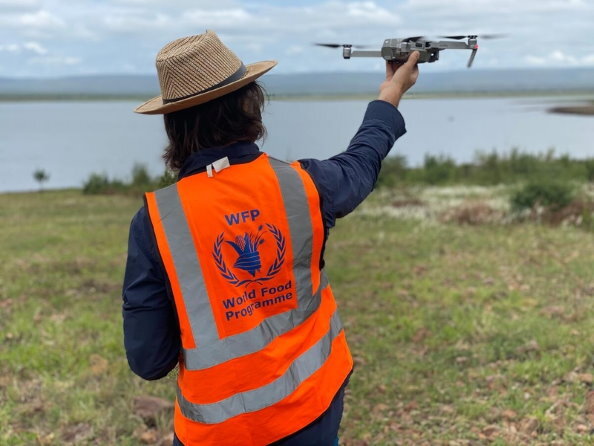WFP boosts global co-operation on humanitarian drone use

To ramp up engagement from leading public, private and academic experts, WFP have launched the platform (https://drones.wfp.org/) to facilitate the safe and ethical use of this emerging technology. The new site complements wider response activities across the humanitarian community and draws on knowledge and experience to document and explore drone use cases, including post-disaster assessment, in-air connectivity and crop monitoring.
WFP and Mozambique government first deployed drones in the aftermath of tropical cyclones Idai in 2019, where thousands of aerial images were captured, creating high resolution maps of damaged areas. The time needed to map the hardest-hit areas was cut in half from roughly one week to two or three days. This experience was crucial in rapidly responding to Eloise, just over a week ago.
“Technology and innovation are great enablers in WFP’s work to tackle famine and climate change.
With responsible handling, drones can help monitor floods, damage and food security, or provide communications connectivity, but we need to urgently step up global cooperation on every aspect of their development and deployment to do this properly,” says Enrica Porcari, Chief Information Officer and Director of Technology for WFP.
Offering low-operating costs and rapid deployment, even in difficult weather conditions, the responsible use of drone technology in humanitarian work requires careful evaluation, cooperation and protocols that focus as much on data protection and public trust as they do on aviation safety.
The UK Government announced multi-year support to WFP in 2019 to coordinate, document and scale drone technology for the humanitarian community. This includes building a dedicated global drones team to support country operations and developing global best practice with the help of technical working groups bringing together drone experts from humanitarian organizations, the private sector and academia.
# # #
The United Nations World Food Programme is the 2020 Nobel Peace Prize Laureate. We are the world’s largest humanitarian organization, saving lives in emergencies and using food assistance to build a pathway to peace, stability and prosperity for people recovering from conflict, disasters and the impact of climate change.
Follow us on Twitter
@WFP_media,
@WFP
@WFPInnovation
@WFPUSA
Access photos and video of WFP Drones (including deployment for storm Eloise on 26 January) here.
Topics
Innovation and technologyContact
For more information please contact:
Jacqueline Martinez de Rosso,
Head of Communications, Technology Division, WFP,
Tel. +33 6 65 65 58 28
Jane Howard, WFP/ London,
Mob. +44 (0)796 8008 474
